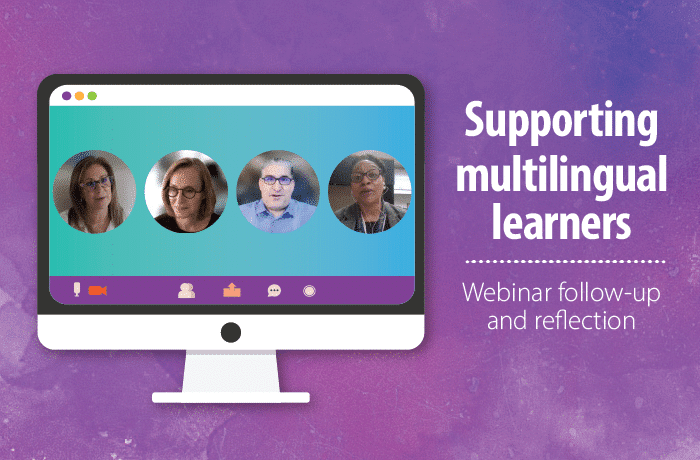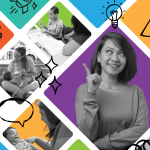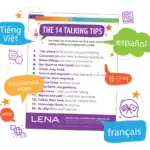[webinar]
Early childhood education may have big improvements to make when it comes to providing the best possible learning opportunities for dual language learners (DLLs). New data analysis using LENA technology suggests that DLLs experience less interaction with their teachers compared to their monolingual peers. This is especially true in classrooms with only monolingual teachers. It’s also especially true in toddler classrooms.
These findings are alarming. They are also, as a webinar hosted by LENA framed the issue, a call to action:
- Researchers must identify instructional practices that optimize early learning experiences and outcomes for dual language learners.
- Research-informed policies must be implemented.
- Early childhood education systems must invest in recruitment and retention of multilingual educators.
- Early childhood education programs must invest in professional development opportunities designed to increase equitable teacher-child interaction, regardless of the language or languages spoken.
Below, watch some of the highlights from this webinar.
Fairness for dual language learners is a personal issue
Tomás Mejia serves as the director of the Colorado Department of Education’s Migrant Education Program. This program provides supplemental resources for migrant children, ensuring that the learning opportunities they are given and the academic outcomes they achieve do not suffer.
At the beginning of the webinar, Mejia introduced himself as the youngest of 13 children, the son of a migrant worker and a high school teacher. When his parents were growing up, he said, the stigma around speaking Spanish in school was strong. That stigma still exists.
Dual language learners experience less interactive talk
Dr. Jill Gilkerson, LENA’s chief research and evaluation officer, led the study about dual language learners in early childhood education. The full analysis, written up in detail in another post, examined day-long audio recordings from 513 children in 64 classrooms across 17 U.S. states. Among the findings:
- Monolingual, English-speaking teachers are more likely to facilitate conversational turns with monolingual, English-speaking children than with DLLs. Bilingual teachers, on the other hand, are more likely to foster more impartial language environments.
- Dual language learners in toddler classrooms are especially at risk of experiencing less interaction with their teachers. This is especially alarming, as prior research has shown that interaction during the age range of 18-24 months bears heavily on long-term academic outcomes.
- DLLs are four times more likely to experience language isolation than their monolingual peers.
- The LENA Grow professional development program is effective at helping monolingual teachers reduce language isolation and increase conversational turns with children who are DLLs.
In the video clip below, Dr. Gilkerson elaborates on one of these findings.
“Best-case scenario, we get staff that speaks the language.”
Unlike the majority of school districts and educational programs across the U.S., Colorado’s Migrant Education Program is staffed entirely by multilingual educators. During the webinar, Mejia posed an important question: How do we ensure that teachers are equipped to provide the very best for DLLs when they themselves are not bilingual. Plentiful research has been conducted on how best to help monolingual teachers provide the very best for DLLs. Difficulties arise, Mejia said, when it’s time to translate that research into practice and to implement those practices in the right places.
“How do we get all of those things that we know into the right places?” he asked.
A proven solution: Head Start’s Planned Language Approach
Consuellis Hawkins-Crudup serves as the Director of Early Learning at the East Coast Migrant Head Start Project. Their mission: to provide holistic, high-quality early childhood education for the children of migrant and seasonal farmworkers.
The East Coast Migrant Head Start Project (ECMHSP) is one organization that has developed a great answer to Mejia’s question of how best to translate research into practice when it comes to providing high-quality early education for dual language learners. The first step, Hawkins-Crudup said, was to ensure that their Head Start educators understood the research behind dual language learning. That includes the research showing that learning multiple languages simultaneously provides positive benefits for children, as well as the research showing how educators can best support DLLs.
Head Start has long been on the forefront of providing resources for educators around issues such as linguistic responsiveness. During the webinar, Hawkins-Crudup pointed specifically to Head Start’s Planned Language Approach (PLA) as an effective model for improving early education environments for DLLs. For one, ECMHSP uses PLA to train educators on pedagogical practices that help DLLs. Furthermore, they have been intentional about adjusting their staffing patterns to ensure that bilingual educators, and the likelihood of equitable language interaction they provide, are in the right classrooms at the right times.
Helping early childhood educators better support dual language learners cuts to the core of LENA’s long-term vision, that every child benefit from positive relationships full of responsive interaction. Early interaction makes a huge difference in children’s early language, cognitive, and social-emotional development. As research has shown, the state of interaction in early childhood education is nowhere near as strong as it should be. Working toward equitable levels of teacher-child interaction for DLLs would go a long way toward turning the tide.



